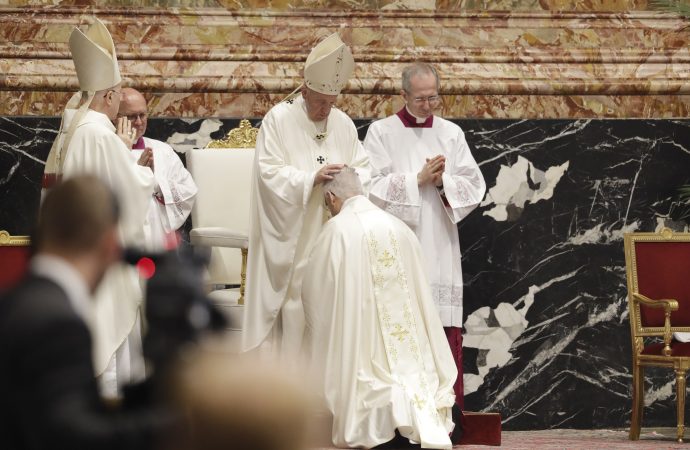After Pope Francis accepted the resignation of one of the two newly appointed auxiliary bishops of Santiago, Chile before his episcopal ordination, the second auxiliary’s ordination, in Rome, was tainted by the presence of two disgraced former archbishops of the Chilean capital.
Cardinals Ricardo Ezzati and Francisco Errázuriz, both emeritus archbishops of Santiago who have been subpoenaed by local prosecutors for covering up cases of clerical sexual abuse, attended the episcopal ordination of Alberto Lorenzelli.
During the ordination, presided over by Francis in St. Peter’s Basilica, the pontiff told Lorenzelli that a bishop is a “servant, a shepherd, a father, a brother, never a mercenary.”
Though most of the homily was the same as that suggested in the Missal for episcopal ordinations, the pope added a few comments, urging the new bishops “not to forget your roots, since you were chosen by men, the episcopacy is the name of a service, not an honor, as the task of the bishop is above all to serve, more than to dominate.”
He also asked Lorenzelli never to forget that the “first job” of a bishop is prayer, and a bishop who doesn’t pray is a “mercenary.
Also present at the ordination was Bishop Celestino Aós, who’s currently the apostolic administrator of Santiago, after Francis accepted the resignation of Ezzati earlier this year. Until last October Errázuriz was a member of the council of cardinals that has advised the pope since the beginning of his pontificate on the reform of the Roman Curia, the Church’s central government.
Italian Archbishop Ivo Scapolo, papal representative to Chile, also took part. As nuncio, he is tasked with making suggestions for possible episcopal appointments. During his time in Chile since 2011, he either advised the pope in favor, or was incapable of convincing him against, the transfer of Bishop Juan Barros to the southern diocese of Osorno, which was the last straw in breaking open the ongoing crisis.
Similarly, Scapolo either suggested or was unable to stop the appointment of Father Carlos Irarrazaval as the second auxiliary of Santiago, announced by the Vatican on the same day as that of Lorenzelli. The appointment, made in late May, had to be backtracked after two interviews in which he enraged survivors of clerical sexual abuse, women and the Jewish community.
Irarrazaval had to resign June 14, before he was even ordained a bishop.
Ezzati and Errázuriz have long been accused by victims of clerical sexual abuse of cover-up, and when the news broke that the two cardinals had travelled to Rome presumably just to participate in the ordination Mass, people went to Twitter to protest.
Juan Carlos Cruz, who was abused by former priest Fernando Karadima, one of Chile’s most infamous abusive priests said that these “criminal cardinals Errázuriz, Ezzati and his gang of bishops have to go to their houses or, preferably, to prison.”
“If we continue like this, even if new bishops are ordained, the Church will never succeed. Criminals!” he added.
Francis has accepted the resignation of eight Chilean bishops over the past year- nine with Irarrazaval- after all of them offered to step down last May. The country’s bishops find themselves engulfed in scandal due to decades of mismanagement, cover-up and, in some cases, personally having committed abuses.
The pontiff also accused them of committing crimes connected to the abuse of minors, including destroying evidence.
Lorenzelli, born in Argentina but raised in Italy, lived in Chile from 2012 to 2018, where he served as provincial of the Salesian province. Since then he’s been in Rome where he was the head of the Salesian Community in the Vatican. He was also the minister of the Vatican’s Security Service and Civil Protection.
He has mostly remained quiet since the announcement of his appointment was made.
Nine bishops, including two cardinals, are in the process of testifying for the roles they played in the more than 160 cases of abuse currently being investigated by the local prosecutors.
Some 220 priests have been credibly accused of abuse, which represents 9.5 percent of the Chilean clergy. That’s above the percentage in other countries, such as the United States, Ireland or Australia, where the number of priests believed to be guilty of abusing minors oscillates between 3 and 6 percent.

